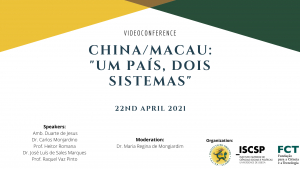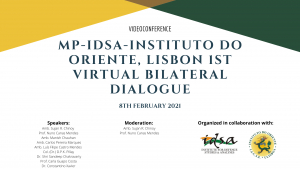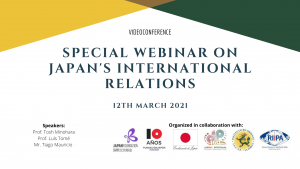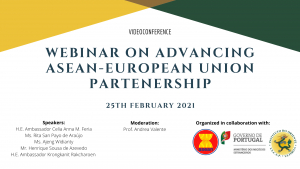Instituto do Oriente
Journal Information
ISSN 1645-4677 (Print) | 2184-9129 (Online)
DOI 10.33167/1645-4677
Legal Deposit 339 105/12
ERC 124011
Frequency - 2 issues per year
Open and Free Acess Publication
![]()
Abstracting and Indexing Services

Editor and Editorial Office
Instituto do Oriente / Instituto Superior de Ciências Sociais e Politicas
Campus Universitário do Alto da Ajuda
Rua Almerindo Lessa - 1300-663 Lisboa
China/Macao: “One Country, Two Systems”
MP-IDSA-Orient Institute, Lisbon 1st Virtual Bilateral Dialogue
Under the context of the Portuguese Presidency of the Council of the European Union (EU), the EU's dialogue with India, as well as the signing of a Memorandum of Understanding (MoU) between the Orient Institute and the Manohar Parrikar Institute for Defense Studies and Analysis (MP- IDSA) a webinar was organized with the presence of experts from both institutions. This event was intended to promote dialogue and deliberate on potential areas of mutual cooperation.
The event took place on February 8, at 15:00 IST (GMT +5.5) / 9:30 (GMT).
You can access the webinar through the following link: https://www.youtube.com/watch?v=l689XuHaZwE&t=17s
Special Webinar on Japan´s International Relations
As part of the celebrations of the 160th anniversary of the Peace, Friendship and Commerce Treaty between Japan and Portugal, a webinar was held in collaboration with the Japan Foundation of Madrid, the Japanese Embassy, the Research Institute of Indo-Pacific Affairs (RIIPA) and the Orient Institute. The topics covered ranged from the relations between the two countries to Japan's role in international relations.
The webinar is available on the Japan Foundation's Youtube channel: https://www.youtube.com/watch?v=bkj3zQCSrBs
Completed Projects
Identity Reformulations in the Special Administrative Region of Macao (2011-2021)
CRISEA - Competing Regional Integrations in Southeast Asia (Horizon 2020) (2017-2021)
Crisis and Migratory Policies: New Mobility Regimes Created by Golden Visa (2016-2017)
Selected Bibliographies (2012-2017)
The State Building and State Failure Debate in International Relations: The Case of East Timor (2007-2011)
Macao - A Revolving Platform between the PRC and Portuguese-speaking Africa (2005-2010)
Barometer of Business Relations between China and Portuguese-Countries: An Economic, Commercial and Cultural Approach (2014-2015)
Analysis and Monitoring of the Transition of the Special Administrative Region of Macao (2000-2004)
An Administration for Timor Lorosae (1999-2004)
Development Factors in the Pearl River Delta: Spatial Integration and Systemic Coherence (1996-2000)
Ongoing Projects
I - Asian Press Review
II - State Building and State Fragility Monitor
III - Democratisation, Economic lessons and EU accession: what Portugal and Turkey can learn from one another (DEEPT)
IV - The Construction of a Lusophone Identity: Portuguese language policy in Macau post-1999
Editorial Statute
Considering that in Portugal the public and academic interest walk side by side with the necessity of a journal of asian studies, it emerged naturally to the Instituto do Oriente of ISCSP to fill in this gap with an editorial project of a Portuguese Journal of Asian Studies.
With a title that suggests a link between the public interest and what is best from the oriental studies in Portugal and a project of enlarged colaboration, in the scope of Social Sciences, the publication Daxiyangguo: Portuguese Journal of Asian Studies, aims, with a semestral periodicity, the dissemination to a public specialised of the major themes of the mordern asian studies, favouring the ones concerning the luso-chinese relations, guiding itself by the criterea imposed by Law to periodic informative publications.
Instructions for Authors
Editorial Policy
The editorial policy of Daxiyangguo – Portuguese Journal of Asian Studies - seeks to follow a broad range on Social Sciences and Humanities subjects, aiming for the dissemination of the most prominent issues of Asian Studies, preferably related with Portugal. The authors should send their original texts and shall not submit them simultaneously to other publications.
Items submission
The items should be submitted electronically to This email address is being protected from spambots. You need JavaScript enabled to view it. using the Microsoft Word format, along with a brief biography of the author. The articles can be submitted in Portuguese or English. Portuguese is the main language of the publication. The articles should preferentially have between 6,000 and 8,000 words, and the book reviews between 2,000 and 3,000 words, including spaces, notes and the reference list.
Peer-review Policy
The first selection of articles will be of the Director. The selected articles will be submitted to a Double-blind peer review process. The reviewers might coincide or not with the members of the journal’s Scientific Advisory Board. When appropriate, a deadline for articles revision by the authors will be provided. In the absence of a reply, the Director and the Editorial Office reserve the right to decide on the publication of the article.
General text guidelines
Spacing (between lines): 1,5
Spacing (between paragraphs): 2
Font: Garamond
Font size: 12
Title: must be in bold and in Portuguese and English.
Authors note: Following the title there should be a short note about the author. This note must include the author’s name, in bold, and bellow the filiation, complete address and email. The author's complete biographical note, as well as acknowledgments, must be introduced at the end of the article.
The author-date system must be used, American Psychological Association style (http://www.apastyle.org/learn/quick-guide-on-references.aspx).
Example: (Coissoró, 2009, p.10).
Tables and figures: indication of the type and number, followed by the title and source. Images will be published in black and white. The submission of high quality images and the permission to publish them are of the author’s responsibility.
Abstract
The Abstract must start with the title “Abstract” on the left, and in bold. The text must have between 100 and 150 words, in Portuguese and English. Two to four keywords should be added bellow, between commas, in Portuguese and English. The title should also be presented both in Portuguese and in English.
Reference list
The Reference List should be listed alphabetically and in English. It shall begin in the first page after the end of the main text. The tile “Reference List” should be indicated at the upper left corner, in bold. The paragraph should be pendent.
Copyright
It is a condition of publication in the Journal that authors assign copyright to Instituto do Oriente/ISCSP-ULisboa. In assigning copyright, authors may use their own material in other publications provided that the Journal is acknowledged as the original place of publication, and Instituto do Oriente/ISCSP-ULisboa is notified in writing and in advance. All articles are published under a Creative Commons Attribution 4.0 International License.
Editorial Board
Director/Editor-in-Chief - Nuno Canas Mendes (IO/ISCSP)
Subdirector - Andrea Valente (IO/ISCSP)
Executive Editor – Patrícia Tomás (IO/ISCSP)
Editorial Assistant – Diogo Cardoso (IO/ISCSP)
Advisory Board
Adriano Moreira (ISCSP)
António Vasconcelos de Saldanha (IO/ISCSP/ Universidade de Macau)
João Paulo Oliveira e Costa (Centro de História e Além-Mar, Universidade Nova de Lisboa)
Ana Cristina Alves (IO/ Nanyang Technological University, Singapura)
Robert Ross (John King Fairbank Center for East Asian Research)
Kjeld Erik Brodsgaard (Asia Research Center, The Copenhagen Business School)
Paolo Santangelo (Instituto Orientale Napoli)
Xiao Chen (Beijing University)
Harry Harding (Elliot School of International Affairs, G.W. University)
Chao-Jen Huang (Taiwan Institute of Economic Research)
Webinar on Advancing ASEAN-European Union Partenership
Under the Portuguese Presidency of the Council of the European Union (EU), and pointing out more than four decades of dialogue between the EU and ASEAN, the Orient Institute, the ASEAN Commission in Lisbon and the Ministry of Foreign Affairs of Portugal held a webinar on the advancement of the ASEAN-EU partnership.
The "Webinar on Advancing ASEAN-European Union Partenership" is available on the Instituto do Oriente's Youtube channel: https://www.youtube.com/watch?v=ddEqhYPa9Og&t=11s








